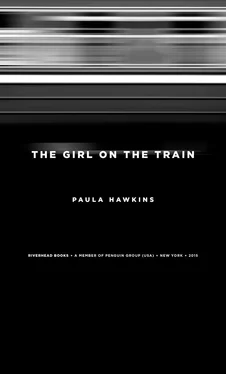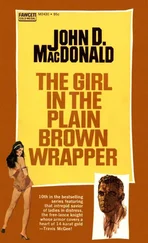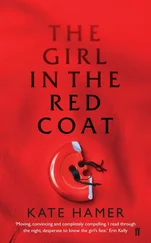Paula Hawkins - The Girl on the Train
Здесь есть возможность читать онлайн «Paula Hawkins - The Girl on the Train» весь текст электронной книги совершенно бесплатно (целиком полную версию без сокращений). В некоторых случаях можно слушать аудио, скачать через торрент в формате fb2 и присутствует краткое содержание. Год выпуска: 2014, Издательство: Penguin Group US, Жанр: Старинная литература, на английском языке. Описание произведения, (предисловие) а так же отзывы посетителей доступны на портале библиотеки ЛибКат.
- Название:The Girl on the Train
- Автор:
- Издательство:Penguin Group US
- Жанр:
- Год:2014
- ISBN:нет данных
- Рейтинг книги:5 / 5. Голосов: 1
-
Избранное:Добавить в избранное
- Отзывы:
-
Ваша оценка:
- 100
- 1
- 2
- 3
- 4
- 5
The Girl on the Train: краткое содержание, описание и аннотация
Предлагаем к чтению аннотацию, описание, краткое содержание или предисловие (зависит от того, что написал сам автор книги «The Girl on the Train»). Если вы не нашли необходимую информацию о книге — напишите в комментариях, мы постараемся отыскать её.
The Girl on the Train — читать онлайн бесплатно полную книгу (весь текст) целиком
Ниже представлен текст книги, разбитый по страницам. Система сохранения места последней прочитанной страницы, позволяет с удобством читать онлайн бесплатно книгу «The Girl on the Train», без необходимости каждый раз заново искать на чём Вы остановились. Поставьте закладку, и сможете в любой момент перейти на страницу, на которой закончили чтение.
Интервал:
Закладка:
I miss him every day. More than anyone, I think. He’s the big hole in my life, in the middle of my soul. Or maybe he was just the beginning of it. I don’t know. I don’t even know whether all this is really about Ben, or whether it’s about everything that happened after that, and everything that’s happened since. All I know is, one minute I’m ticking along fine and life is sweet and I want for nothing, and the next I can’t wait to get away, I’m all over the place, slipping and sliding again.
So, I’m going to see a therapist! Which could be weird, but it could be a laugh, too. I’ve always thought that it might be fun to be Catholic, to be able to go to the confessional and unburden yourself and have someone tell you that they forgive you, to take all the sin away, wipe the slate clean.
This is not quite the same thing, of course. I’m a bit nervous, but I haven’t been able to get to sleep lately, and Scott’s been on my case to go. I told him I find it difficult enough talking to people I know about this stuff—I can barely even talk to him about it. He said that’s the point, you can say anything to strangers. But that isn’t completely true. You can’t just say anything . Poor Scott. He doesn’t know the half of it. He loves me so much, it makes me ache. I don’t know how he does it. I would drive me mad.
But I have to do something , and at least this feels like action. All those plans I had—photography courses and cookery classes—when it comes down to it, they feel a bit pointless, as if I’m playing at real life instead of actually living it. I need to find something that I must do, something undeniable. I can’t do this, I can’t just be a wife. I don’t understand how anyone does it—there is literally nothing to do but wait. Wait for a man to come home and love you. Either that or look around for something to distract you.
EVENING
I’ve been kept waiting. The appointment was for half an hour ago, and I’m still here, sitting in the reception room flicking through Vogue , thinking about getting up and walking out. I know doctors’ appointments run over, but therapists? Films have always led me to believe that they kick you out the moment your thirty minutes are up. I suppose Hollywood isn’t really talking about the kind of therapist you get referred to on the National Health Service.
I’m just about to go up to the receptionist to tell her that I’ve waited long enough, I’m leaving, when the doctor’s office door swings open and this very tall, lanky man emerges, looking apologetic and holding out his hand to me.
“Mrs. Hipwell, I am so sorry to have kept you waiting,” he says, and I just smile at him and tell him it’s all right, and I feel, in this moment, that it will be all right, because I’ve only been in his company for a moment or two and already I feel soothed.
I think it’s the voice. Soft and low. Slightly accented, which I was expecting, because his name is Dr. Kamal Abdic. I guess he must be midthirties, although he looks very young with his incredible dark honey skin. He has hands I could imagine on me, long and delicate fingers, I can almost feel them on my skin.
We don’t talk about anything substantial, it’s just the introductory session, the getting-to-know-you stuff; he asks me what the trouble is and I tell him about the panic attacks, the insomnia, the fact that I lie awake at night too frightened to fall asleep. He wants me to talk a bit more about that, but I’m not ready yet. He asks me whether I take drugs, drink alcohol. I tell him I have other vices these days, and I catch his eye and I think he knows what I mean. Then I feel as if I ought to be taking this a bit more seriously, so I tell him about the gallery closing and that I feel at a loose end all the time, my lack of direction, the fact that I spend too much time in my head. He doesn’t talk much, just the occasional prompt, but I want to hear him speak, so as I’m leaving I ask him where he’s from.
“Maidstone,” he says, “in Kent. But I moved to Corly a few years back.” He knows that wasn’t what I was asking; he gives me a wolfish smile.
Scott is waiting for me when I get home, he thrusts a drink into my hand, he wants to know all about it. I say it was OK. He asks me about the therapist: did I like him, did he seem nice? OK, I say again, because I don’t want to sound too enthusiastic. He asks me whether we talked about Ben. Scott thinks everything is about Ben. He may be right. He may know me better than I think he does.
TUESDAY, SEPTEMBER 25, 2012
MORNING
I woke early this morning, but I did sleep for a few hours, which is an improvement on last week. I felt almost refreshed when I got out of bed, so instead of sitting on the terrace I decided to go for a walk.
I’ve been shutting myself away, almost without realizing it. The only places I seem to go these days are to the shops, my Pilates classes and the therapist. Occasionally to Tara’s. The rest of the time, I’m at home. It’s no wonder I get restless.
I walk out of the house, turn right and then left onto Kingly Road. Past the pub, the Rose. We used to go there all the time; I can’t remember why we stopped. I never liked it all that much, too many couples just the right side of forty drinking too much and casting around for something better, wondering if they’d have the courage. Perhaps that’s why we stopped going, because I didn’t like it. Past the pub, past the shops. I don’t want to go far, just a little circuit to stretch my legs.
It’s nice being out early, before the school run, before the commute gets going; the streets are empty and clean, the day full of possibility. I turn left again, walk down to the little playground, the only rather poor excuse for green space we have. It’s empty now, but in a few hours it will be swarming with toddlers, mothers and au pairs. Half the Pilates girls will be here, head to toe in Sweaty Betty, competitively stretching, manicured hands wrapped around their Starbucks.
I carry on past the park and down towards Roseberry Avenue. If I turned right here I’d go up past my gallery—what was my gallery, now a vacant shop window—but I don’t want to, because that still hurts a little. I tried so hard to make a success of it. Wrong place, wrong time—no call for art in suburbia, not in this economy. Instead, I turn right, past the Tesco Express, past the other pub, the one where people from the estate go, and back towards home. I can feel butterflies now, I’m starting to get nervous. I’m afraid of bumping into the Watsons, because it’s always awkward when I see them; it’s patently obvious that I don’t have a new job, that I lied because I didn’t want to carry on working for them.
Or rather, it’s awkward when I see her . Tom just ignores me. But Anna seems to take things personally. She obviously thinks that my short-lived career as a nanny came to an end because of her or because of her child. It actually wasn’t about her child at all, although the fact that the child never stops whinging did make her hard to love. It’s all so much more complicated, but of course I can’t explain that to her. Anyway. That’s one of the reasons I’ve been shutting myself away, I suppose, because I don’t want to see the Watsons. Part of me hopes they’ll just move. I know she doesn’t like being here: she hates that house, hates living among his ex-wife’s things, hates the trains.
I stop at the corner and peer into the underpass. That smell of cold and damp always sends a little shiver down my spine, it’s like turning over a rock to see what’s underneath: moss and worms and earth. It reminds me of playing in the garden as a child, looking for frogs by the pond with Ben. I walk on. The street is clear—no sign of Tom or Anna—and the part of me that can’t resist a bit of drama is actually quite disappointed.
Читать дальшеИнтервал:
Закладка:
Похожие книги на «The Girl on the Train»
Представляем Вашему вниманию похожие книги на «The Girl on the Train» списком для выбора. Мы отобрали схожую по названию и смыслу литературу в надежде предоставить читателям больше вариантов отыскать новые, интересные, ещё непрочитанные произведения.
Обсуждение, отзывы о книге «The Girl on the Train» и просто собственные мнения читателей. Оставьте ваши комментарии, напишите, что Вы думаете о произведении, его смысле или главных героях. Укажите что конкретно понравилось, а что нет, и почему Вы так считаете.












